Dune: Spice Wars entered Early Access in April 2022, with a fair chunk of hype behind it. The release of the movie a year prior had amped people up, ready for more spice highs, it seems. 16 months later, Spice Wars has now received its full release. Has the time cooking out in the Arrakis desert proven prudent? The answer is somewhat yes, somewhat no.
When the title was first announced, the Early Access period was planned to deliver a story mode campaign, online multiplayer, more units, more factions and various fixes. The promised single-player campaign appears to have been swallowed by a sandworm, unfortunately. However, the rest of the scheduled updates appear to have made it to the desert surface, won’t the council be pleased.
Shiro Games have declared Dune: Spice Wars a completed package after all of this, so let’s hop in our Ornithopters and recon the land to see if there’s a spice worth fighting for.
Single-Player Comedown
For those as yet unaware, Dune: Spice Wars is a 4X real-time strategy title based on the sandy landscapes of Arrakis. At launch, there are three main single-player modes: a 1v1 duel, a 4-player medium length skirmish and a longer-term conquest. The promised campaign is as real as the desert mirage in the distance.
The game suffers from the lack of real story or narrative. Arrakis as a setting is fantastically mysterious and full of lore begging to be explored, so to not fully take advantage of this is disappointing. The available modes provide a decent mix of faster-paced rounds and longer-term engagements over multiple years, though.
For example, on the 4-player mode you can achieve victory through five different means, while on the longer-term one you may just have to be the first to reach 30,000 Hegemony (land domination). Personally, I wasn’t especially sold on the 1v1 duel option, it just felt a bit light. Plus, being able to make a truce with your only opponent on the map seems… odd.
Online doesn’t really fare much better either. When you take on the wider world and colonisers of Arrakis, you can only partake in a fast-paced 1v1 or a chaotic 4 person skirmish. No longer options exist, which feels limiting for a strategy title. What’s available here works and does the job, but Dune: Spice Wars feels like it’s lacking personality as a result, as there’s no narrative hooks to invest you in the wider war.
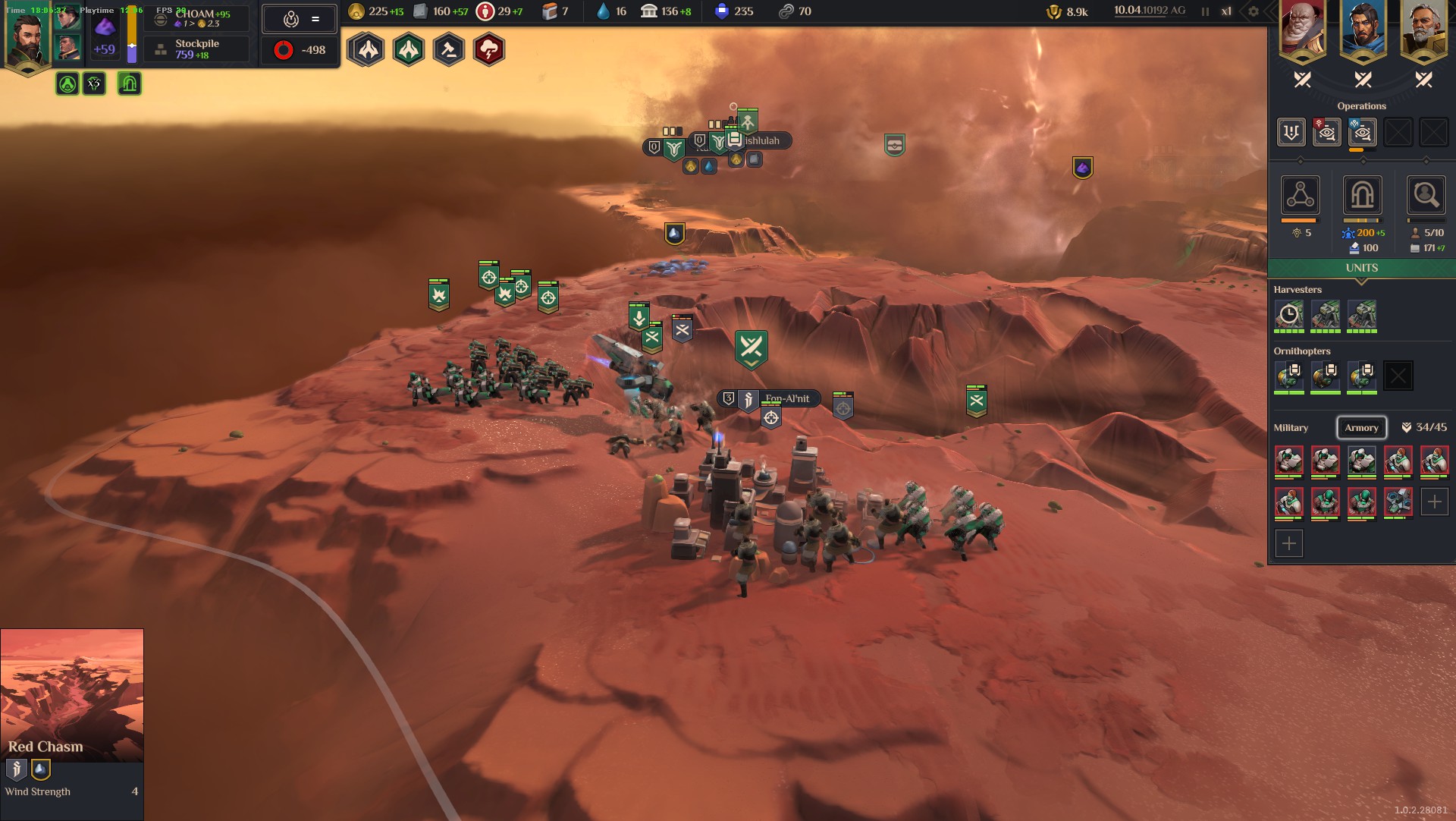
Early Worm Catches The Bird
With the caveat of modes and campaign out of the way, it’s time we examined Dune: Spice Wars’ gameplay offering. The basic premise of any match is simple – expand your territory by conquering villages, develop your bases and outgun, outwit or out-politically maneuver your opponents. As previously mentioned, you can succeed through political, militaristic or economic means.
The game makes excellent use of Arrakis’ desert setting by making water consumption a core component of your units ability to traverse the world. Venturing away from bases puts pressure on their supplies, meaning they potentially can’t reach neighbouring villages to continue your expansion. Every village has a finite number of build slots, meaning it’s tough to just stockpile resources to succeed.
Alongside water consumption (with buildings all draining this precious resource), you’ll need to maintain currency, fuel cells, plascrete, authority, hegemony, manpower and intel. It’s certainly a lot of icons and levers to be pulling on at any time, especially as a deficiency in any one of them will cause a slowdown in your ability to progress.
Once you get your head around all the terms and + or – symbols however, it all just starts to make sense. Upon hitting the halfway point of a match, you’ll likely have created a stable flow of all of them, or you’ll have fallen apart. On the surface it is very complicated, but beneath the first layer of sand, it’s pretty intuitive to learn.
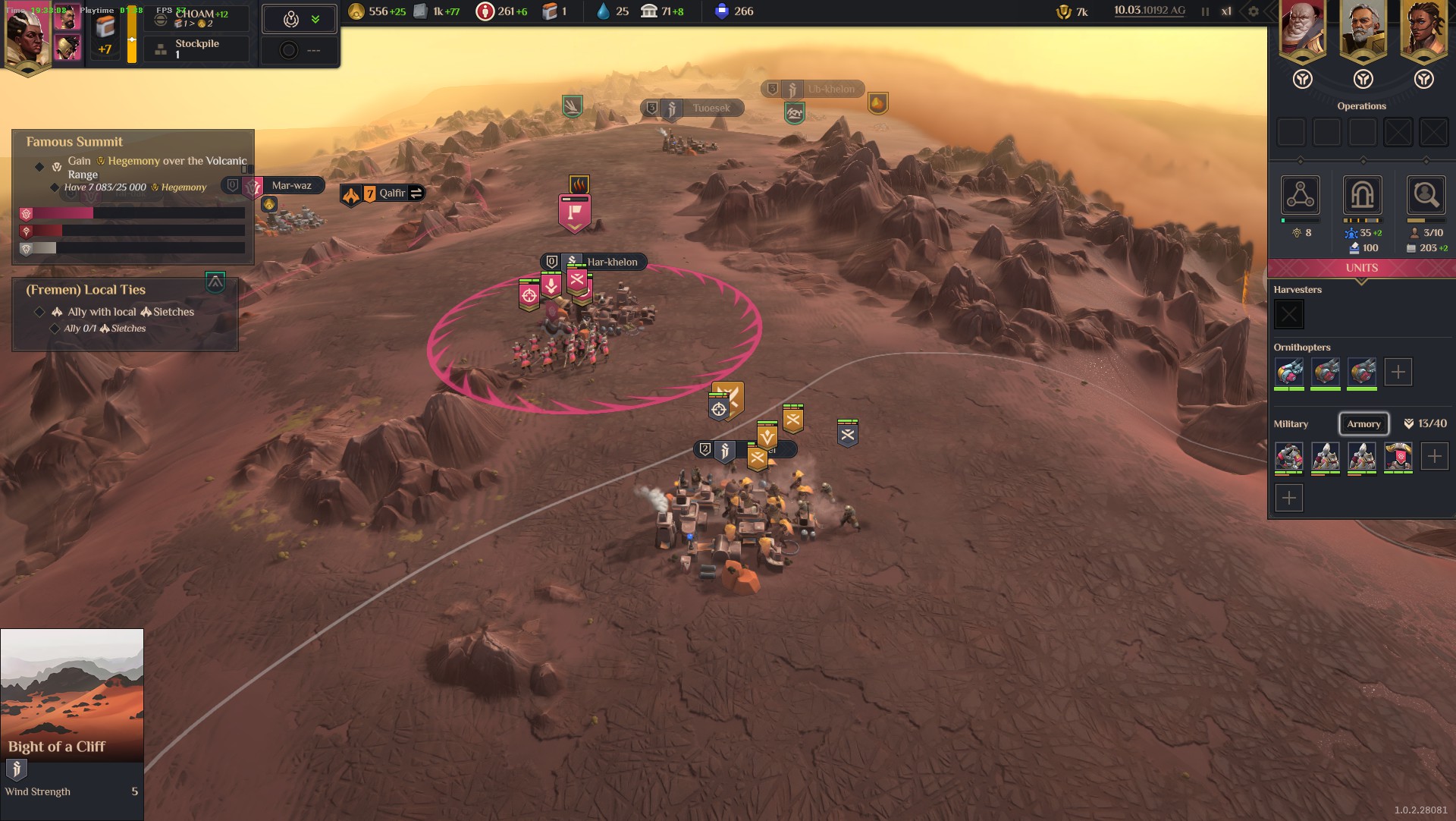
The Spice of War
If you’ve any passing knowledge of the Dune books or movie, you’ll know that tensions between factions are a key part of the drama. Dune: Spice Wars is no different, providing a decent set of combat options to expand your influence over the landscape. Each faction has about seven unique units they can deploy, which can be used to annex or pillage neighbouring villages.
Positioning and effective deployment of your troops is most important, as most engagements boil down to who has the larger army. Deviously stealing an outpost from an opposing faction was definitely fun, but the conflict options themselves are surprisingly light. I never felt there was a whole lot of actual strategy other than keep ranged units at the back and melee units up front.
Consequently, being militaristic can have its fun moments, but its not especially deep. I spent more time waiting for my authority number to grow so I could keep annexing settlements than I did considering warfare strategy. Even with the more guerilla-warfare based factions, I found myself not really having to adapt a strategy, more just throwing units where I wanted something.
Once you’ve researched enough you can eventually gain access to nuclear warheads, which are massive gamechangers. It’s undoubtably entertaining to atomise three enemy villages in one blow, but it again doesn’t really deepen the options at your disposal. Instead, you’ll be more engaged with Dune: Spice War’s political mind games.
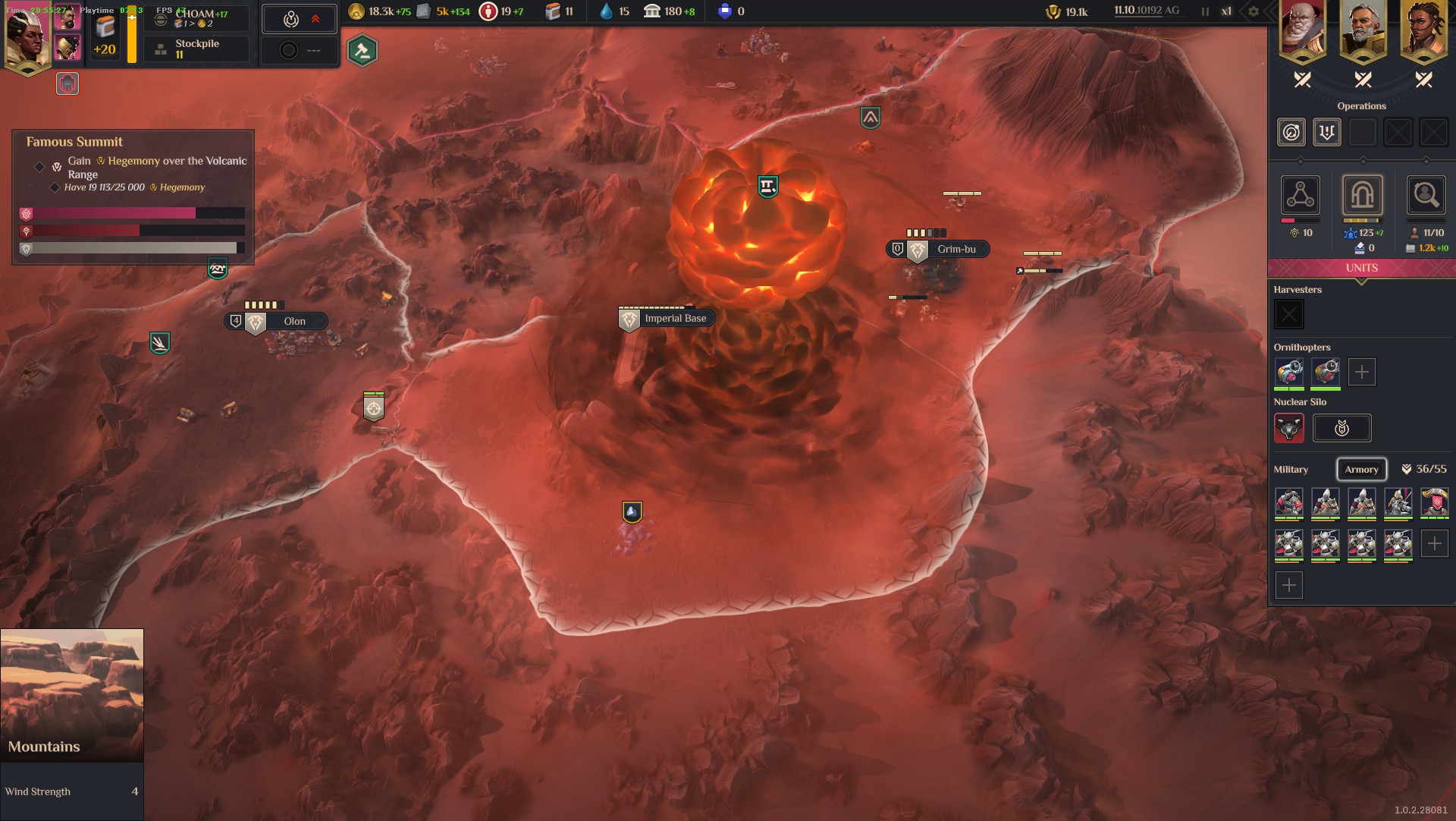
How Could You Treaty This Way?
Dune: Spice War’s most interesting mechanic is the Lansraad council, which will convene frequently during a match. At any given meeting, up to three resolutions can be voted for using political standing and influence. Want to make sure the Harkonnen have to spend double the Solari to upkeep their troops? Plow in those votes, dear governor!
Every faction with suitable standing can use votes and influence, so it adds a dynamic flavour to each in-game period of time. Higher standing in the council will lead to a faction even being elected to the highest position, maintenance of which can win you a match. Accruing influence and getting the edicts in your favour is a fun system and the variety of resolutions is pretty good.
Unfortunately, I can’t really say the same for the diplomacy options. Your interactions with other factions boils down to trade and negotiating a truce, that’s it. No devious alliances, no tricking opponents into opportune wars. There is an espionage menu where you can enact certain programs to weaken your enemies, but it’s a fairly clunky system I just didn’t really bother with.
The five factions that are available all have their own strengths and weaknesses, which incentivises pursuing particular win conditions, which is nice. Due to the lack of story and dialogue however, they’re a little bit lifeless – a still painting that represents them instead of a fully-fledged society with interesting backstory. As such, diplomacy and trade are lightweight and unengaging, which for an RTS like this, is a missed opportunity.

Spice, Spice, Baby
Conquests in Dune: Spice Wars will place you on to a variation of the same desert-based map for each campaign. To achieve any victory condition, you’ll need to expand into sectors near your primary base and slowly grow your control of the map. Different sectors will hold different resource deposits and the all-important drug high: Spice.
Succeeding on Arrakis will require (in most matches) to maintain control of a limited number of Spice fields. An Imperial tax will be demanded consistently in matches, failure of which to meet will bring negative ramifications. Spice is also essential to sell for Solari, creating a tug of war between meeting the tax and making big money.
Dune: Spice Wars uses both this and other small details to create an authentic recreation of the source material. Ornithopters, Harvesters, Sandworms and unique unit designs all sell the setting superbly. It helps that the game adds ease-of-use options to not have to micro-manage operations, like Harvesters automatically recalling when a Sandworm approaches or Ornithopters acting as recon drones.
Credit to Shiro Games for crafting their RTS around the Spice idea, but I can’t say it feels fully utilised. The depiction of the world and the factions is fantastic, but it feels like an aesthetic achievement more than a mechanic or gameplay one. As part of the wider strategy and resource management systems, it’s integrated well, but I never saw Spice as a make-or-break piece of the victory puzzle.
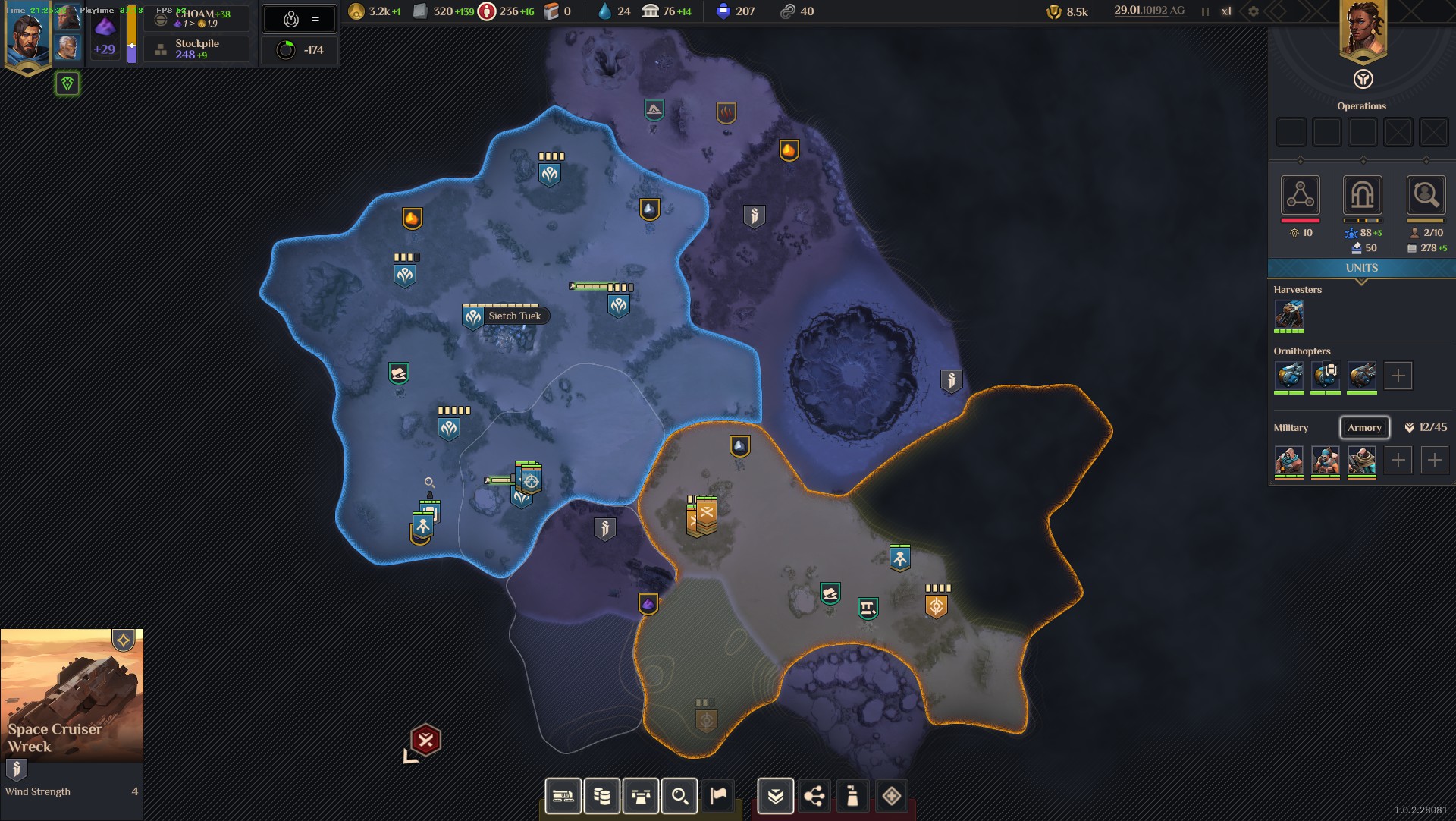
Beige Harvest
In terms of performance, Dune: Spice Wars runs great on my PC. I haven’t noticed any framerate drops, there’s been no crashes and the visual information is clear and helpful. Graphically, the world map looks great, but finer details like battle animations and unit details are lacking. They’re not bad by any means, but they aren’t especially impressive.
Factions are clearly displayed with obvious colour palettes, which is handy in a rapid skirmish. However, after just two or three rounds, I found the beige colour scheme of the map a bit bland. Arrakis is a desert, I know, but the lack of visual variety becomes uninteresting a bit too quickly. Given the excellent performance, perhaps more time in Early Access could have been spent improving this element.
Which brings me to the package of content currently on offer. There are five factions, each with their own handful of units and their own perks, and there are three core modes. From what I understand, the developers have added a significant amount of content over the Early Access period, but the final product still feels a bit underwhelming.
It all leaves Dune: Spice Wars feeling like a competent 4X RTS with some good ideas and commitment to the source material, but lacking in any real personality or depth. It runs well, plays well and looks decent, but the flair just isn’t popping on this sandy horizon.
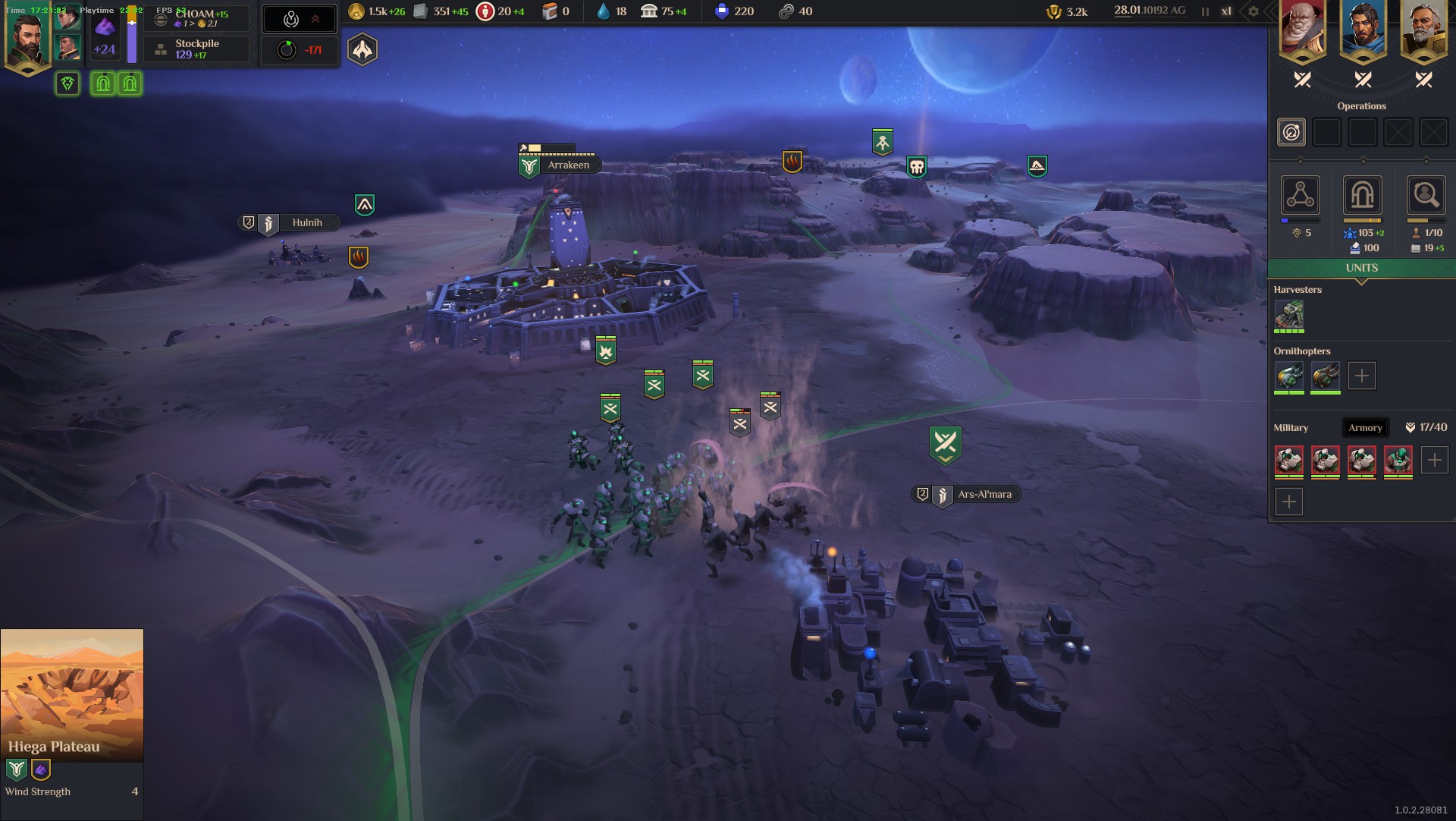
A Coarse Surface
If you’re a huge fan of the source material and you enjoy a dabble in RTS gameplay, there’s probably enough here to justify jumping into Dune: Spice Wars at this stage. I fear that for veterans of the genre, there’s just not enough gameplay variety or tactical options to keep things engaging for the long-term.
The lack of a fully-fledged campaign or story mode is a disappointment, despite the considerable work put in during the Early Access period. Arrakis feels as wide as the Sahara but as deep as a grain of sand as a consequence.
Having said all of that, when I’ve been expanding my territory, annexing villages and nuking The Fremen (I know, I’m awful), watching my florescent pink border grow and grow, I’ve been having a lot of fun. It’s relatively simple, after the initial learning curve, but not every game has to have thousands of menus and formation options to be a good game.
Dune: Spice Wars therefore ends up in the “good, but not great” category of RTS’. I plan to spend a bit more time with it and go for each of the available win conditions (cause I’m stubborn like that). It’s not one of my favourite RTS games and I doubt it’ll see much playtime into the future, but it’s a solid, competent strategy title that does its source material justice, for the most part.
A lack of the promised single-player story mode, middling graphics and relatively shallow combat systems threaten to consume Dune: Spice Wars in the maws of a Sandworm. Thankfully, it’s somewhat rescued by an authentic recreation of the Dune universe and the scope of available ways to play. It won’t be usurping the Imperial council, but the launch of Arrakis’ mining wars is a solid, if unspectacular one.

Dune: Spice Wars is available now on PC (review platform).
Developer: Shiro Games
Publisher: Funcom
Disclaimer: In order to complete this review, we were provided with a promotional copy of the game. For our full review policy, please go here.
If you enjoyed this article or any more of our content, please consider our Patreon.
Make sure to follow Finger Guns on our social channels –Twitter, Facebook, Twitch, Spotify or Apple Podcasts – to keep up to date on our news, reviews and features.
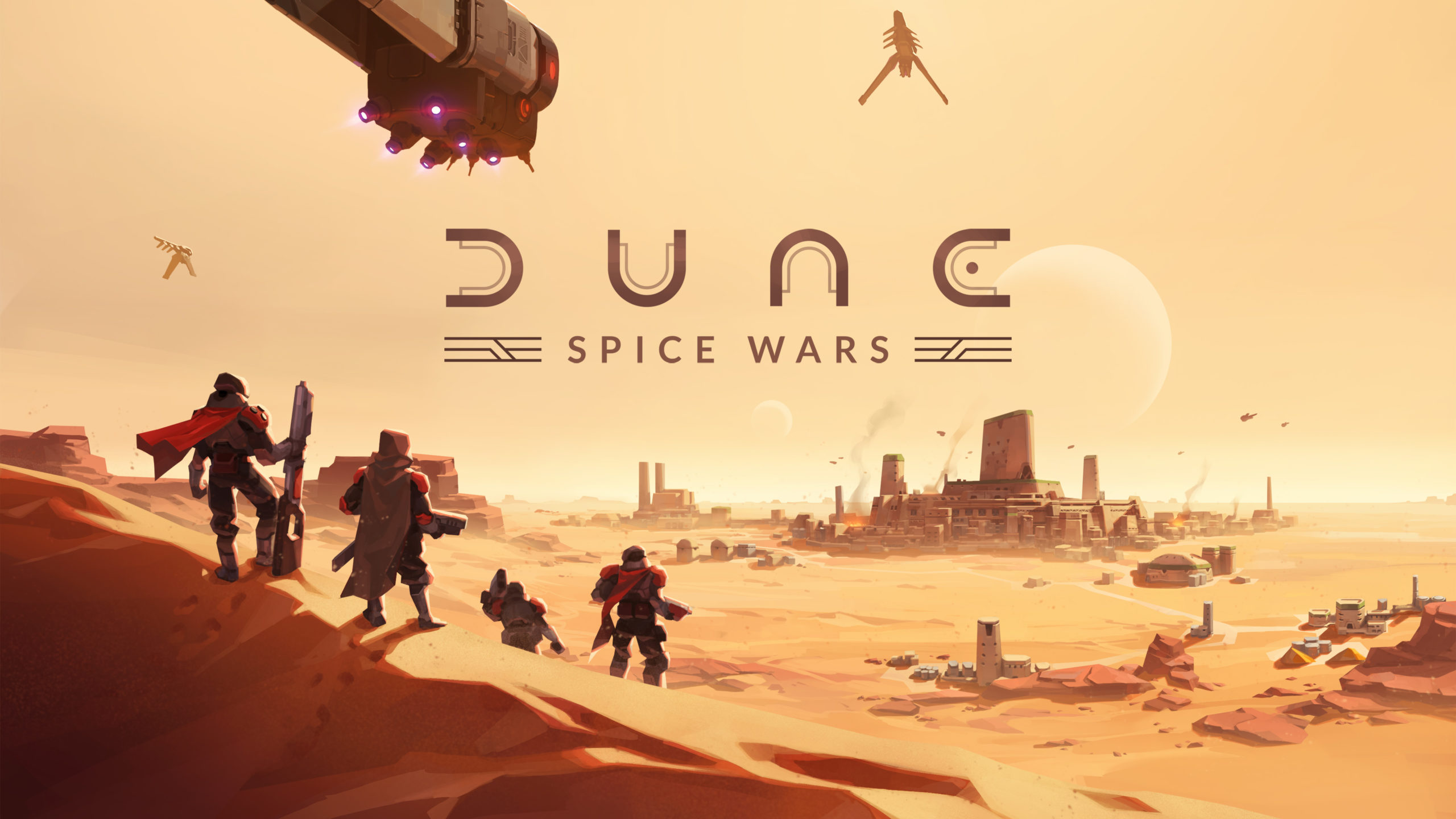
COMMENT
The promised single-player campaign appears to have been swallowed by a sandworm, unfortunately
They promised a campaign. Not just a story campaign. Nowhere ever did Shiro ‘promise’ that.